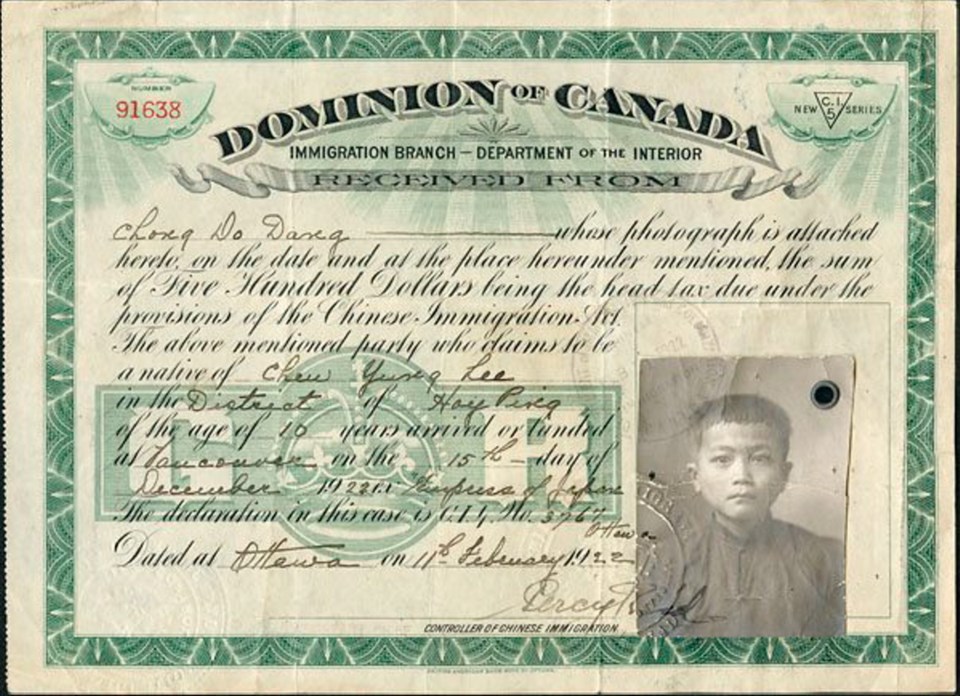The B.C. legislature will try to make amends today for the racist provincial policies and attitude that led to the Chinese head tax.
I wonder what all the long-gone newspaper hacks — my professional ancestors — would make of the day’s events. Because they put in years of work whipping up the hysteria on which the policies were based and egging on the politicians to go further in excluding Chinese from B.C. and curbing the lives of those already here.
Press gallery group photos stretching back a century grace a stairwell at the legislature. They show a shifting collection of white men, most of whom helped keep readers outraged at the prospect of Chinese people coming to B.C. to make lives for their families, exactly as Europeans did. They are the working stiffs who filed copy as directed to keep the story going. They reported to editors who responded to the public appetite and wrote raving commentaries about the horrors represented by Asian immigrants, then demanded that politicians react.
When it comes to making a judgment on a public issue, it’s pretty clear — retrospectively — the media of the day blew the call. The only saving grace is that almost the entire society of the day was on the same wavelength. Pretty much every group ended up on what turned out to be the wrong side of the issue. But as someone who watches history go by from the same seats, it’s fascinating for me to think about how comprehensively wrong those generations of newspapermen were.
Historian Patricia Roy has spent years reading their copy in researching her books on the topic. In The Oriental Question, she made observations about the role of newspapers. Whether they make or reflect public opinion, is always debatable. “Had they followed lines of argument incompatible with the majority opinion of their readers and advertisers, they were unlikely to survive.”
Maybe that’s what led to observations like this, from the Prince George Herald: “If you believe in the superiority of the white race, do your duty (by not patronizing Asian-run businesses).”
The Vancouver World was one of the most vehement anti-Asian papers. After some laundries in Vancouver closed, the paper suggested that Chinese-run businesses didn’t contribute to the economy because owners sent their money “home to the Flowery Kingdom to await the exigencies of pleasant old age.”
After a Chinese student came second in a school scholastic event, the Daily Colonist in Victoria opined: “We hold no brief for Chinese children, nor to the mixture of the Orient and the Occident in the schools.” The writer concluded that if white children were spurred to further study, the Chinese may be “a blessing in disguise.”
Over the run of the anti-Asian chapter, it was a rare example of (back-handed) tolerance. A year later an Asian student won the contest outright. The Vancouver Sun responded with this: “The yellow peril is not yellow battleships or yellow settlers, but yellow intelligence.”
Linking Chinese immigrants to drugs, gambling and squalor was a standard story in those years. The Nanaimo Free Press observed: “Individually we like and admire them. But those foreign characteristics we find interesting … lead to a veritable Chinese puzzle when these people are placed in the same social conditions as ourselves … by reason of their divergent standards of living and conduct.”
The Western Methodist Recorder said in 1921 that B.C. should teach respect for laws, “remembering that if we fail to Canadianize the Oriental, he will not fail to Orientalise us.”
It’s just a scant sampling of appalling coverage. It’s not for me to apologize for how media long ago reflected or amplified the world as it was. But it’s for all of us to remember how the prevailing view of the day doesn’t always turn out to be the right one.



